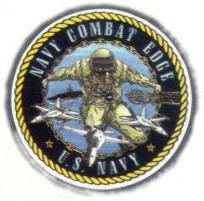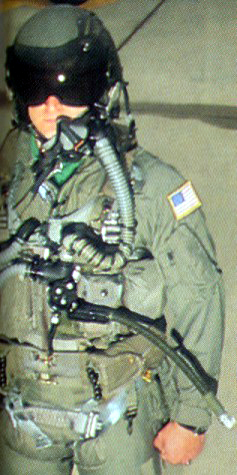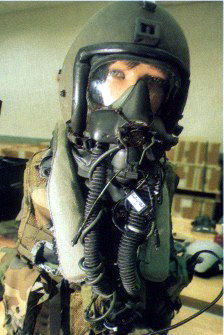|
 This
article appeared before in the Airforces Monthly may 1997 issue
and is used with kind permission of Key Publishing Ltd. It is
slightly altered for use on this web site. This
article appeared before in the Airforces Monthly may 1997 issue
and is used with kind permission of Key Publishing Ltd. It is
slightly altered for use on this web site.
The times when just a G-suit like the CSU-13/P was enough to
withstand the forces of flying are long gone. The modern fighter
plane is limited by the pilot's physical possibilities. To help
the pilot to survive in the hostile environment of his own
plane, new gear is being developed.
The US Navy's Combat Edge system provides the tactical
difference that will enhance the pilot's ability to withstand
high G forces. It reduces the associated fatigue and minimize
the chance of G-LOC (G-induced loss of consciousness). The
system allows pilot's to fly more sorties and improve their
operations.
 The
Gear The
Gear
The US Air Force Combat Edge system was used as the basis to
meet the unique US Navy requirements. The Air Force uses the
MBU-20/P mask, the CRU-94/P oxygen block and the CSU-17/P
counter pressure vest. The Navy then opted for a lower garment
that offers a 40% increase in coverage over current G-suits.
They developed a dramatically improved and reliable man-mounted
mini regulator. They upgraded a new helmet that was, at the
time, recently introduced into the inventory and proved
effective during 600kts wind blast and ejection tests. This
helmet being the HGU-68/P.
Since 1990, while in the developmental stages, the Combat Edge
system was exercised in the Warminster centrifuge by a dedicated
and intrepid subject pool. A few of them experienced forces of
+11 G during this time and remained conscious. The ensemble was
also worn and exercised by four Fleet squadrons (two US Navy and
two US Marine Corps) during 1993. It drew favorable comments of
the users. The Commander in Chief of Naval Operations decided to
cancel the project, but it was brought back on line at the
insistence of the Fleet.
Navy
Combat Edge (A/P22P-16) provides tactical aircrew with an
assisted pressure breathing for G (PBG) system for positive
acceleration protection between +4 and +9 G to an altitude of
50,000feet. Below the +4 G threshold, the ensemble will function
like the current CSU-13/P or CSU-15/P anti-G suit. The system
components include an upgraded HGU-68/P helmet with a bladder,
now named HGU-87/P. MBU-24/P oxygen mask, being a MBU-20/P with
US Navy communications, CSU-21/P counter pressure vest,
CSU-103/P oxygen regulator and CSU-20/P enhanced anti-G lower
garment (EAGLE).
Further
new introduction in to the US Navy, is the Navy Combat Edge
Chemical/Biological/Radiation (CBR) exposure protection system.
This probably being the follow up to the AR-5 CBR mask.

Source: Airforces Monthly
|